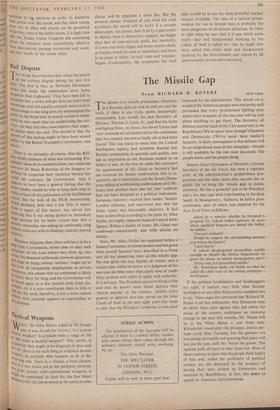Rail Dispute
wo things have become clear about the nature
of the. railway dispute during the past few daYS. The first is that, as Nicholas Davenport writes this week, the railwaymen seem 'more desperate than frightened.' They have been left in 00 doubt that a strike will get them no short-term `idvantage, and will equally certainly work to their disadvantage in the long term, by encouraging the Public in the belief that its money would be better sPeht on new roads than on modernising the rail- ‘'ttYs; yet they feel they must express their anger, 00 flatter what the cost. The second is that the growth of this.feeling ought to have been sensed ecirlier by the British Transport Commission; and Wasn't.
There is no certainty, of course, that the BTC ,Was Wholly unaware of what was simmering. Pre- 410-lably some of its members knew, but could not c°ovince Sir Brian Robertson of the dangers; or Perhaps he suspected their existence himself but Could not convince the Government. And it appears to have been a general feeling that the 6:ilort leaders would be able to keep their men in "eel: at least till the publication of the Guillebaud report. But the bulk of the NUR membership, fs'llich probably feels that it has little to expect believing report of this nature, was stirred into that it was being denied an immediate Wage increase for no better reason than that a 'remote committee was taking an intolerably long Ole to Come out with its findings; and this proved decisive.
n Whatever happens, then, there-will have to be a 8.ew style Commission, better able to deal with cituations of this kind before they blow up into rises. No financial settlement, however generous, c an hope to bring railway workers' wages up to the level of comparable employment in private
ei lterprise; this means that no settlement is likely
to
faced them for long, and the Commission will
13, ' 'aced again in a few months with fresh dis- coeallient. As it is now constituted, there is little it roil do; the need, therefore, is for a more radical th °I'M than anybody appears to contemplate at e nionnent.






































 Previous page
Previous page